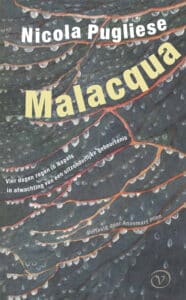Extreem weer – de roman Malacqua, over hoe de stad Napels dagenlang wordt geteisterd door hevige regenval, is niet alleen vanwege het onderwerp actueler dan ooit. Het boek mag dan dateren van 1977, de prikkelende en bijzondere schrijfstijl van Nicola Pugliese is, mede door de uitstekende vertaling van Annemart Pilon, ook nu nog verrassend, fris en modern.
Eigenzinnige auteur
De Italiaan Nicola Pugliese (1944-2012) is auteur van één boek. In 1977 publiceerde de Italiaanse auteur Italo Calvino, die bij het bekende uitgevershuis Einaudi werkte, Puglieses beknopte roman Malacqua. Pugliese schreef het naar verluidt in 45 dagen, en weigerde daarna er ook nog maar iets aan te veranderen. De eerste druk van het boek was binnen een paar dagen uitverkocht. De auteur had beslist dat het boek pas ná zijn dood mocht worden herdrukt, en zo geschiedde. Mede daarom is het pas nu in Nederlandse vertaling verschenen.
Dagenlange regen
Malacqua – ‘slecht water’ – gaat over de stad Napels, die wordt getroffen door een regenbui die dagen aanhoudt. Al na de eerste nacht ontstaat er een zinkgat en stort een gebouw in, waarbij in totaal zeven doden vallen. Vanachter de gekanteelde torens van Castel Nuovo klinkt een reutelend geluid op, een lange zucht, stemmen, een schreeuw. Het lijkt uit een pop te komen, dezelfde pop die ook in het zinkgat werd aangetroffen. Wat is hier aan de hand?
Journalist Carlo Andreoli doet verslag van alle vreemde gebeurtenissen en hoe de stad eronder lijdt. ‘… en het water stroomde langzaam en groef, het groef, en sneed, en groef, en sneed…’ Al na de eerste rampzalige dag, als ook de tweede dag de regen onophoudelijk blijft neerdalen en er die vreemde stemmen uit het Castel Nuovo komen, bekruipt de bewoners een gevoel van naderend onheil, dat er iets staat te gebeuren dat hun perspectief op het leven zal veranderen.
De regen houdt ook de derde dag niet op, noch de vierde. Funderingen worden ondermijnd, buurten geëvacueerd. De Napolitanen houden hun adem in en wachten. Ze leven tussen hoop en vrees – maar vooral in vrees. En die apocalyptische sfeer zet mensen aan het denken over hun leven.

Zo eigenzinnig als Pugliese was, zo eigenzinnig zijn ook diens stijl en vertelwijze. Herhalingen, ontbrekende interpunctie, interrupties, zinnen waar geen einde aan lijkt te komen – de auteur trekt geheel zijn eigen plan. Dat maakt dit werk ook nu heerlijk authentiek, fris en boeiend.
In een nawoord vertelt Annemart Pilon over de uitdagingen die ze tegenkwam bij het vertalen van dit verhaal. Mooi, zo’n kijkje in de keuken van een vertaler, die vaak zo weinig aandacht en erkenning krijgt voor dit mooie en belangrijke werk. Want daardoor voelt dit lezenswaardige werk ook na bijna vijftig jaar aan als een roman van nu.
